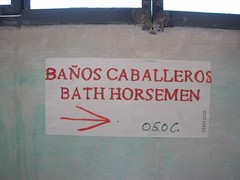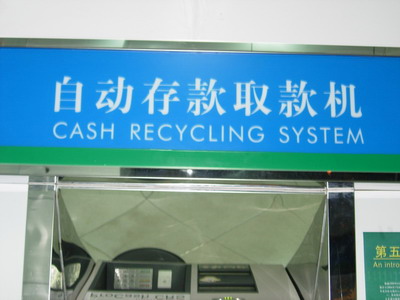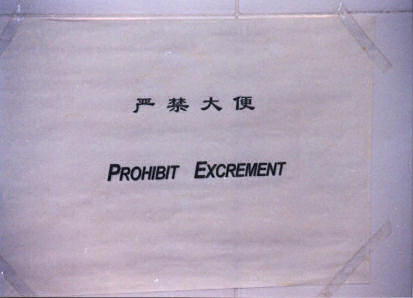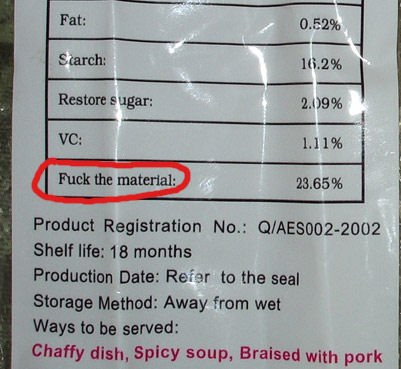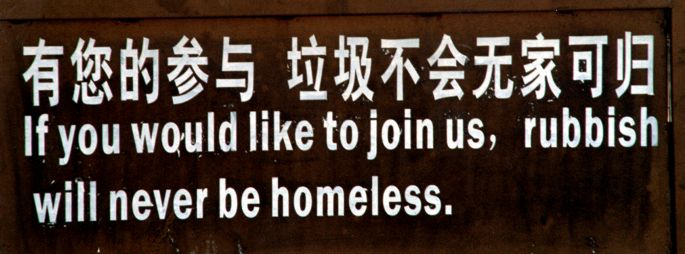|
взгляд с противоположной стороны ))) Foreigners looking like fools with gobbledygook tattoos
By MARK SCHREIBERKoi itai (love hurts). Sekira (stark naked). Kuso (s**t).
Are these the sort of expressions you'd want permanently etched into a visible portion of your epidermis? Probably not. But as San Francisco-based columnist Tomohiro Machiyama writes in Cyzo, growing numbers of Americans are arranging to have kanji (Sino-Japanese ideographs) tattooed on their bodies, with results that range from the incomprehensible to the hilarious.
Pop diva Britney Spears, for example, is said to have the character hen inscribed on her derriere. Ms. Spears' intention may have been to convey an aura of mystery, but to Japanese its meaning is closer to "weird" or "perverted."
Machiyama describes his encounter in a shop selling comic books when he spotted the characters ai-yoku (love and lust) on the lower back of a gothic-styled gal, who was squatting by a shelf.
"What are you staring at?" she challenged him.
"Uh, your tattoo. It's in kanji."
"That's right," she says. "You're Chinese or Japanese, so you can read it. It means 'Love and Passion,' right?"
"Well, mmmm . . . yeah, uh-huh, that's right," Machiyama stammers, not wishing to rain on her parade.
Well, at least it didn't read "Beef & Broccoli."
Last April, notes Machiyama, the New York Times turned its attention to this phenomenon in an article titled "Cool tat, too bad it's gibberish," and from this he discovered a blog, www.hanzismatter.com , set up by Tian Tang, a graduate student of engineering at Arizona State University. The site, which claims to be "dedicated to the misuse of Chinese characters in Western culture," posts photographs of the more bizarre kanji tattoos.
"I'm very surprised a lot of times that people will e-mail me about their tattoos, and they never found out the real meaning before they got it," Tang is quoted as saying.
Clearly part of the problem is that few tattoo artists in the United States are familiar with Sino-Japanese characters, the NYT article points out.
"[They] copy the characters from templates that are often of uncertain provenance. When two characters are combined to form what is in English a catchy phrase, context can be lost and the result can be hilarious -- or worse."
Several star players in the National Basketball Association sport kanji tattoos. Shawn Marion of the Phoenix Suns was under the impression that his nickname, "the Matrix," was tattooed on his leg, but Tang says the inscription translates as something like "demon bird mothballs."
On rare occasions these have invited trouble. Fox News reported a fight nearly broke out on the court when Chinese star Yao Ming of the Houston Rockets lost it and began laughing at a tattoo on a rival player's neck, which he interpreted to mean "power forward stinky pants."
"If the tattoo appeared on his bicep the more likely translation would be 'strong muscle, smelly pits'," Yao later said through an interpreter. "He should have consulted with a knowledgeable interpreter before paying for a permanent mark on such a visible part of his body."
But before Japanese ridicule Americans' awkward attempts to festoon their bodies with Asian graffiti, Machiyama wonders how many Japanese are aware of their country's reputation for mangling English.
Samples of such boo-boos -- many with scatological or sexual overtones -- are posted daily on the Web site Engrish.com. Most are submitted by overseas visitors and Japan residents who spot examples of misusage.
Cyzo provides such examples as "My Wet" (premoistened towelettes); "Feel Up" (from a book of roadmaps); and a somewhat cryptic sign in a rail station that reads, "For Restrooms, Go back toward your behind."
"So if you see a foreigner wearing a T-shirt emblazoned with the words Nihonjin kanojo boshuchu (recruiting a Japanese girlfriend)," Machiyama advises, "you don't need to tell him what it means. He's wearing it because he's trying to pick one up."
Of course, if you see a girl clad in a shirt with the same message, she might appreciate a tap on the shoulder.
Or maybe not.The Japan Times: Sunday, Dec. 31, 2006© All rights reserved
http://search.japantimes.co.jp/print/fd20061231t3.html
|


